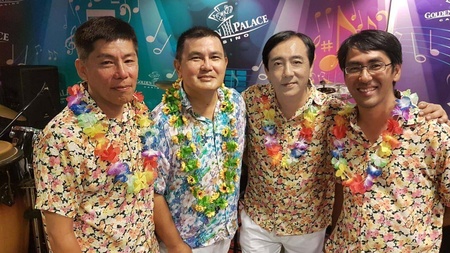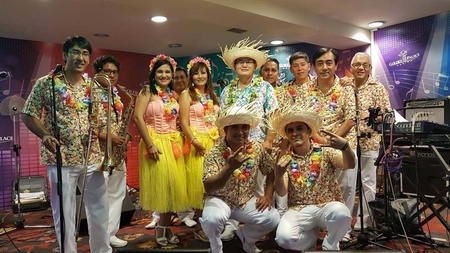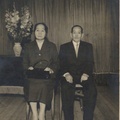Several years ago I heard people commenting about “The Teruya Orchestra” and saw that they animated many events, especially in our community in Lima, Peru. It caught my attention because of the last name Teruya, my second last name is that, many told me that that orchestra belonged to my family, I just laughed when I heard it.
Almost a couple of years ago I read an article in Perú Shimpo , where they interviewed César Teruya, from the orchestra, telling a lot about his history with it and his beginnings as a musician, accompanying his brother, who did it in the Nikkei orchestra. “Seventy Seven.” He was a child and music was something that he felt very close to, over time it became his passion, he formed the Arizona Nisei orchestra, then in 1989 he joined the musical framework of Los Morunos, becoming the director of the orchestra.
But his life took many turns, he went to Japan like many, attracted by the benefits of the country of our ancestors, looking for other directions, but working very hard. Music is something that called him and surely did not leave him alone, so he returned to it, he even had the luxury of living off it in the land of his grandparents, Japan. Life kept going in circles and he returned to Peru for family reasons, initially to dedicate himself to business, maybe he felt the call of music again and that's how he was back in Lima musically, first playing individually, with Los Morunos, to start the Teruya International Orchestra in 1996.
If we start to think about it now, I think that, along with Seventy Seven, they are the only Nikkeis that has an orchestra. We begin to remember, especially those of us who are based five or more, that groups like RH Positivo, Seventy Seven, Fresa Nisei remain in our memories. , that they gave us so many pleasant moments, I personally remember many of the parties we attended at the AELU, a club that houses the majority of the Nikkei community, which those of my time still call the AFO (Okinawa Fraternal Association), now AOP (Okinawa Association of Peru).
The guys who precede us in the Majestic Hall, the Chinese Charity, I think had parties almost every week, while we Nikkei eighties settle for New Year's parties, carnivals and Halloween parties. We were part of the crisis generation, even leave at home was difficult because terrorism and blackouts, car bombs, and tips were also limited. The trend was generally the boys drinking on corners or where they sold beer, while the girls sat, waiting to dance, until almost halfway through the party, when the boys had just gained courage and the party was short for them. And when it was already dawn, people were asking for more music, and having to wait until the next party.
Those were the times when the body could withstand everything, many times, some worked on Sunday or helped the family business and they had to do their shift and they did, because that was the deal with parents. Others were in the university preparation academy and Sundays were for seminary, the test was to keep their eyes open in class. What they now call "ticket", which continues long, without sleeping. Now I can explain why in the AELU (the community's Nikkei club) the oldest football matches were scheduled early and the youth category was scheduled as late as possible, because they know that many come from a dawn party and not They show up to play.
In those times the Nikkei orchestras moved more within the colony, at social parties, weddings, birthdays and every possible event. But we see that currently the Teruya International Orchestra opens its borders more and we can see them playing in many events of the Nikkei community, even collaborating, but also in events outside of it. César's management of the orchestra is more businesslike, more professional, many details are taken into account, being up to date, analyzing each event, what type of client he is, it can be celebrations for Mother's Day, Father's Day, Halloween , the December holidays. For the client's complete satisfaction, they have to meet with them, listen to what they have in mind, know what type of audience, theme and ages they will play for, and thus prepare their repertoire. The important thing for them is the interaction with the public, it is what shows that they are successful in an event, weddings are an example of this.
Flavia is César's partner, the general coordinator of all movement and organization within the orchestra. She saw him for the first time at a meeting, where he worked. They organized singing competitions where they were also judges. It was a mutual friend who introduced them, they started dating and love arose. Safe between songs and music, César reached his heart. Flavia remembers that they have been together for twelve years now, César has two grown children, from his previous engagement, who are now professionals, one is an architect and the other works in advertising; She has a 14-year-old daughter from a previous engagement and they now have a daughter together, who is now seven years old.
An ordinary day for César is between his computer, the piano, and instruments, trying to come up with the songs that he is going to include in the repertoire, but it is not easy at all, it takes him a lot of time, he makes the arrangements and the scores for each musician. ; low, winds, it seems very simple, but that takes a lot of time.
Managing the orchestra is like any company, you have to hire personnel and they must be the most suitable, they always look for responsibility, punctuality and seriousness, you cannot allow failures, arriving late, being absent; He respects people but he also wants them to respect him and, above all, his work. Most likely, César is accustomed to the values that his parents and grandparents taught him, values that he himself was able to verify when he lived in Japan and that he has always practiced, which has made the orchestra so successful.
Generally, in addition to musicians, dancers and choreographers are brought to corporate events; There are twelve musicians, a choreographer, three dancers and five people from the sound team. In addition to César there are three more Nikkei in the orchestra, Juan Shinzato (timpani), who played with César in Arizona Nisei; Hayime Higa (bass), with whom he was a classmate at the José Gálvez del Callao school; Dany Miyahira (trombone), musician he met on Facebook. Life goes between rehearsals, bringing out new songs, practicing until it turns out well, then recording them, seeing what the errors are and correcting them. While it is true in the presentations you see a lot of joy, everyone looks very good, it looks perfect, a lot of glamour, costumes, the management of the lights, the perfect sound, happy and enjoying everything, but behind it there is a lot of work, effort , hours of rehearsal so that it comes out as seen on stage, quite an investment to give the best to the client.
This is where the success of the orchestra lies, especially because the advertising is by word of mouth, they are all recommendations or because they attended one of their presentations, at the casino, at a wedding, an event organized for a company, for a Mother's Day, Father's Day, Christmas, New Year's, a birthday, an anniversary.
Before, all the management fell to César, but it was a very heavy burden. Then Flavia began assuming tasks, they divided that work, but they also understood that things had to be delegated, making it clear each task that each one should do. This has made her family life better organized as well, trying to dedicate Monday, Tuesday, Wednesday to her daughters, when they are a little freer and try to go to the beach or the pool, a pleasure that the whole family shares. , especially on holidays, to the joy of his daughters.
But both recognize that they could not do it if they did not have the support of her parents, the girls stay with them, of course on special dates the justified claim comes, they want them to stay to receive the New Year, for example , but little by little they are also understanding that their work is like that, and that it has its compensations, because when the other parents can't do it on weekdays, they can dedicate it to them. The best of all is that they are a family that gets along very well, starting with Flavia and César, who find it easy to work together as they share many things in common; They both try to help each other, cultivating trust between them.
We must recognize all of César's professionalism, the orchestra already has more than twenty years of daily struggle, recognized by many people, both inside and outside the Nikkei community, perhaps even more so. It has a homogeneous team of musicians, singers, all of them very professional, but above all a team where each one trusts the work of the other. There have been very good moments, but also difficult ones, but in addition to being a very good musician, he has shown that he is a great businessman, who has known how to weather all situations, proof of this is the years that the group has had. Behind him is a very good woman, who has known how to support him in everything, in addition to the charisma and beauty she shows on stage. Outside, they are an ordinary couple, who likes to go to the beach or the pool, enjoy time with the girls, with the family, they like dogs and are saddened by a lost or abandoned dog, trying to find its owner.
There is a point on which César, Flavia and the entire orchestra agree, that although it is true that what they do in the orchestra is something that everyone likes; The effort, the practices, the rehearsals, the hours before, during and even after each presentation, make it worth it, it is when the audience leaves happy, has fun, has an unforgettable moment, leaves completely satisfied, wanting to further.

© 2018 Roberto Oshiro Teruya








